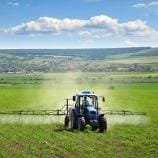(STRASBOURG) – Members of the European Parliament called Wednesday for a ban on all uses of glyphosate-based herbicides in private and public green areas, including spraying in and around public parks, playgrounds and gardens.
In a non-binding resolution, they also called for restrictions on use in agricultural fields shortly before harvesting, and said a new glyphosate licence should be limited to seven instead of 15 years.
This follows concerns about the carcinogenicity and endocrine disruptive properties of the glyphosate, which is used in many farm and garden applications. MEPs now want an independent review and publication of all the scientific evidence that the European Food Safety Authority (EFSA) used to assess glyphosate.
The Commission should also reassess its approval of glyphosate in the light of its pending classification by the European Chemicals Agency (ECHA), under separate legislation, they add.
The vote was welcomed by Greenpeace. Its food policy director Franziska Achterberg said: “MEPs are right to call for tough restrictions of glyphosate use, but these are not sufficient to protect people and the environment. The science shows that glyphosate is a threat for public health and must be banned outright. A ban in cities and gardens would not prevent large-scale contamination of food, water, soil and air.”
The Commission should, say MEPs, table a new draft in order to better address the sustainable use of herbicides containing glyphosate and also to launch an independent review of the overall toxicity and classification of glyphosate, based not only on data relating to carcinogenicity but also on possible endocrine-disruptive properties.
Glyphosate is an active substance widely used in herbicides. Patented in the early 1970s, it was introduced to the consumer market in 1974 as a broad-spectrum herbicide and quickly became a best seller. Since its patent expired in 2000, glyphosate has been marketed by various companies and several hundred plant protection products containing glyphosate are currently registered in Europe for use on crops.
MEPs also condemned as “unacceptable” the use of glyphosate in a farming practice known as “green burndown”, i.e. the killing of the actual crop plant prior to harvest in order to accelerate ripening and facilitate harvesting. This practice leads inter alia to increased human exposure.
Next steps
National experts sitting in the Standing Committee on Plants, Animals, Food and Feed (Phytopharmaceuticals Section) will vote to adopt or reject the Commission proposal by qualified majority in May. If there is no such majority, it will be up to the Commission to decide.
Further information, European Parliament
Adopted text will be available here (click on 12.04.2016)
EP research: renewing authorisation for glyphosate


